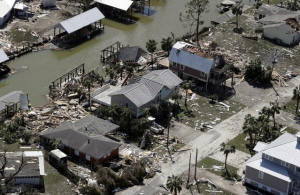|
Volunteer search teams born of prior
disasters reactivated in Florida
 Send a link to a friend
Send a link to a friend
 [October 13, 2018]
By Steve Gorman [October 13, 2018]
By Steve Gorman
(Reuters) - Volunteer search-and-rescue
networks formed during previous flood disasters in Texas and Louisiana
sprang into action in Florida this week following Hurricane Michael,
providing a boost to authorities hit by electricity and communications
outages.
By Friday, two days after Michael plowed into Florida's Panhandle as one
of the fiercest hurricanes ever to strike the U.S. mainland, there was
no official word on the number unaccounted for in beachfront communities
affected by the storm.
But the all-volunteer group CrowdSource Rescue said its search teams
were trying to locate more than 2,100 people. Loved ones reported the
majority unaccounted for, while a smaller number found themselves
stranded and sought help, group co-founder Matthew Marchetti said.
Most of the search effort focused on Bay and Gulf counties, which took
the brunt of the storm while Panama City and Mexico Beach, the towns
nearest Michael's landfall accounted for the largest numbers reported
missing, he added.
Marchetti said the search teams, made up mostly of off-duty police and
firefighters, also had either rescued or accounted for 345 other
individuals reported to Houston-based CrowdSource Rescue.

That organization, set up in response to deadly flooding that swept the
Gulf Coast of Texas after Hurricane Harvey last year, has about 650
rescuers on the ground in Florida this week, Marchetti told Reuters. He
said 3,500 more were helping coordinate efforts from afar.
To communicate, they relied on a digital application called Zello that
lets cell phones send and receive short-wave radio transmissions, as
well as an Uber-like app with global-positioning satellite (GPS)
technology to pinpoint those in distress.
Similar volunteer outfits operating under the name Cajun Navy and formed
in New Orleans following Hurricane Katrina in 2005 also sent teams to
Florida.
The private, non-profit efforts add to a force of more than 1,700
government-based searchers across Florida, Governor Rick Scott's office
said in a statement. Those include 20 urban rescue teams, seven
swift-water rescue teams and nearly 300 ambulances.
[to top of second column]
|

Homes destroyed after Hurricane Michael smashed into Florida's
northwest coast in Mexico Beach, October 11, 2018. Chris
O'Meara/Pool via REUTERS

Relatives of people who defied evacuation orders in Mexico Beach, a
town where the storm obliterated shorefront neighborhoods, also
posted messages on the Facebook pages of law enforcement pleading
for help finding relatives.
But widespread power outages and disruptions in landline and
cellular phone networks hampered authorities' communications with
each other and the public, said Ruth Corley, a spokeswoman for the
Bay County Sheriff's Department.
With two television stations knocked off the air for two days,
authorities had to rely on a college radio station to broadcast
public service bulletins.
Except for emergency 911 systems, authorities there were virtually
without telephone or internet service until late on Friday.
"We didn't have anything," Corley said. "We've been writing things
down on pieces of paper. We're doing what we can with the minimal
media that we have."
(Reporting by Steve Gorman; Editing by Clarence Fernandez)
[© 2018 Thomson Reuters. All rights
reserved.]
Copyright 2018 Reuters. All rights reserved. This material may not be published,
broadcast, rewritten or redistributed.
Thompson Reuters is solely responsible for this content.
 |